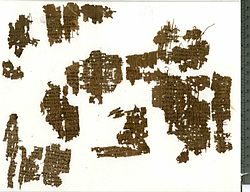Papyrus Oxyrhynchus 5101

Papyrus Oxyrhynchus 5101, (designated as P.Oxy.LXXVII 5101, LDAB 140272 Archived 2019-03-28 at the Wayback Machine or Rahlfs 2227) is a papyrus roll which now only survives as small pieces. It is written in Koine Greek of the Septuagint (LXX). It has been palaeographycally dated to have been written between 50 and 150 C.E.
The manuscript contains the tetragrammaton to represent the Divine Name of God (Yahweh) written in palaeo-Hebrew script.[1][2][3][4]
References[change | change source]
- ↑ Meron Piotrkowski; Geoffrey Herman; Saskia Doenitz, eds. (2018). Sources and Interpretation in Ancient Judaism: Studies for Tal Ilan at Sixty. BRILL. p. 149. ISBN 9789004366985.
- ↑ Amin Benaissa. "The Oxyrhynchus Papyri Vol. LXXVII (London 2011) by Amin Benaissa". Retrieved December 14, 2012.[permanent dead link]
- ↑ Francisco A. J. Hoogendijk. Review of: A. Benaissa (2011) The Oxyrhynchus Papyri, Volume LXXVII (2015)
- ↑ Michael P. Theophilos. Recently Discovered Greek Papyri and Parchment of the Psalter from the Oxford Oxyrhynchus Manuscripts: Implications for Scribal Practice and Textual Transmission Archived 2019-03-14 at the Wayback Machine. Australian Catholic University.
